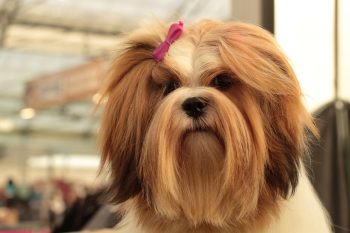The Lhasa Apso, with its flowing coat and noble bearing, is a breed steeped in a rich history that dates back to the monasteries of Tibet. Known for their watchful and independent nature, these dogs were revered as guardians and companions. While they are small in stature, their personalities are anything but, exude a unique blend of humor, dignity, and aloofness. However, like all breeds, Lhasa Apsos come with their own set of challenges that might not make them suitable for every home. This article aims to provide an objective perspective on some of the potential downsides of owning a Lhasa Apso, while still recognizing the endearing qualities that make them beloved companions to many.
7 Reasons Why Lhasa Apsos Might Not Be Right For You
Intensive Grooming Requirements: Lhasa Apsos have a beautiful, long, and dense coat that requires extensive grooming. Regular brushing is necessary to prevent matting and tangling, and professional grooming is often needed to maintain their coat’s condition, which can be time-consuming and costly.
Stubborn and Independent Nature: These dogs are known for their independent and sometimes stubborn temperament. Training a Lhasa Apso requires patience and consistency, and they may not be the best choice for first-time dog owners who are unfamiliar with handling a strong-willed breed.
Prone to Barking: Lhasa Apsos can be quite vocal. They were bred as watchdogs in the monasteries of Tibet, and this trait persists, leading them to bark at unfamiliar sounds or intruders. This can be a challenge, especially in apartment living or noise-sensitive environments.
Potential for Aggressiveness: If not properly socialized, Lhasa Apsos can be wary of strangers and may exhibit aggressive tendencies towards unfamiliar people or animals. Early socialization and training are crucial to prevent these behaviors.
Health Issues: Like many breeds, Lhasa Apsos are prone to certain health problems, including eye issues and hip dysplasia. Prospective owners should be aware of these potential health concerns and be prepared for the responsibility of veterinary care.
Exercise Requirements: While they are not a highly active breed, Lhasa Apsos still require regular exercise to maintain their health and prevent obesity. They enjoy walks and playtime, which requires a commitment from their owners.
Sensitivity to Heat: Their dense coat can make them prone to overheating in hot weather. Owners need to be cautious during warm temperatures to ensure their Lhasa Apso doesn’t get too hot and stays comfortably cool.
Lhasa Apsos are charming, loyal, and have a rich heritage, they come with specific needs and challenges. Understanding these aspects is essential for anyone considering adding a Lhasa Apso to their family, ensuring a happy and harmonious relationship with this dignified and unique breed.
On The Other Hand…
5 Positive Qualities About Lhasa Apsos
The post Are Lhasa Apso’s The Worst Dog? – Food for Thought appeared first on iHeartDogs.com.

